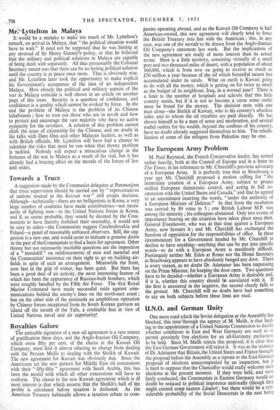Towards a Truce
A suggestion made by the Communist delegates at Panmunjom that truce supervision should be carried out by "representatives of nations neutral in the Koiean war" still awaits decision. Although—technically—there are no belligerents in Korea, a very , large number of countries have made contributions—not neces- sarily of fighting men—to the United Nations forces in Korea, and if, as seems probable, they would be deemed by the Com- munists to have thereby forfeited their neutrality, it would not be easy to select—the Communists suggest Czechoslovakia and Poland—a panel of reasonably unbiased observers. Still, the sug- gestion is a new one, and would seem to indicate a genuine desire )n the part of the Communists to find a basis for agreement. Other thorny but not necessarily insoluble questions are the imposition of a " standstill " on reinforcements of men and material and the Communists' insistence on their right to go on building air- fields in spite of such an arrangement. Meanwhile the front, now fast in the grip of winter, has been quiet. But there has been a good deal of air activity, the most interesting feature of which has been the appearance of Russian-built bombers, which were roughly handled by the Fifth Air Force. The 41st Royal Marine Command have made successful raids against com- munications behind the enemy's lines on the north-east coast ; but on the other side of the peninsula an amphibious operation by Chinese forces recaptured from its South Korean garrison an island off the mouth of the Yalu, a creditable feat in view of United Nations naval and air superiority:


















































 Previous page
Previous page